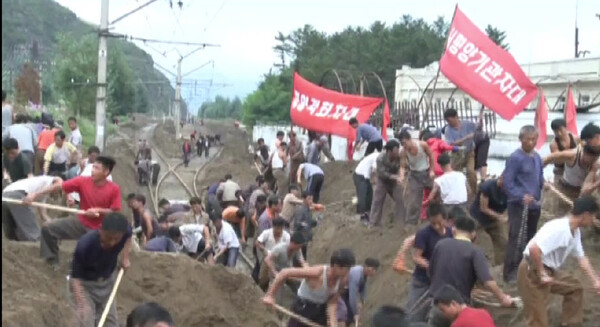hankyoreh
Links to other country sites 다른 나라 사이트 링크
With government still refusing, civil society pushing for flood aid to N. Korea

Members of the public are moving to provide direct aid to North Koreans affected by floods that have claimed 138 lives and left more than 400 missing.
Some 68,000 North Koreans have reportedly have been affected by torrential rains that fell on parts of North Hamgyong and Yanggang Provinces last month due to Typhoon Lionrock. Damages have been severe, with homes and farmland inundated and roads and railways left in a state of collapse. With winter temperatures in North Hamgyong Province falling as low as 25 degrees below zero, those left without homes appear likely to face heavier damages once the cold arrives. North Korea responded by taking the unusual step of showing scenes of damage to the international community and declaring the flooding “the largest disaster since Liberation.”
The International Committee of the Red Cross offered emergency relief by providing US$520,000, while the UN World Food Programme moved on Sept. 13 to provide seven days’ worth of biscuits and other emergency relief rations to 150,000 North Koreans. But the situation is expected to deteriorate further, with 600,000 people currently lacking drinking water and the food shortage poised to worsen over the winter. The UN has begun raising funds from the international community to meet the US$28.2 million it sees as necessary to provide food aid and temporary shelter to 143,000 residents of the North Hamgyong Province region.
Also, on Sep. 21, Tomas Ojea Quintana, the new United Nations Special Rapporteur on human rights in North Korea, called for swift, increased support to those affected. “Given the scale of destruction, the number of individuals affected, and the fact that winter is rapidly approaching, time is of the essence,” he stressed.
North Korea’s response has been cool. Following its fifth nuclear test on Sept. 9, calls for sanctions against it have been gaining traction. The foreign ministers of South Korea, the US, and Japan met at the site of the UN General Assembly in New York to release a statement denouncing Pyongyang and announced plans to consider heavy sanctions. The South Korean Ministry of Unification said on Sept. 19 that the “possibility of aid is low even if North Korea requests it.”
Even if private groups decide to provide humanitarian assistance, government permission is still required. The Ministry of Unification refused permission to the Korea NGO Council for Cooperation with North Korea to contact Pyongyang to discuss aid for flood recovery, but Seoul maintains the issue is still “under consideration.” The council has said that as the weather gets colder, it is considering “indirect methods of support through the International Red Cross Society and other bodies, if direct support is not possible.”
In response, civic groups and others have begun individual fundraising efforts while calling for permission to provide humanitarian assistance. Their argument is that even if strict sanctions are applied against North Korea, avenues for humanitarian aid to vulnerable residents should be made available. The Buddhist committee of the Autonomous Peace and Unification Practice Alliance released a statement on Sept. 17 calling for permission to provide private aid in response to flood damages, which it called “the only way to relieve inter-Korean relations from their current strain.”
Korean-American Shin Eun-mi also shared news of a crowd-funding effort to help North Korean residents on her Facebook page (https://www.youcaring.com/north-korean-flood-victims-650750). The fundraising effort’s goal is to collect US$10,000 to provide 15 tons of rice, with US$7,260 in donations as of the morning of Sep. 21.
Fundraising efforts for North Korean flood victims have also been under way in US civil society. The group Freedom in North Korea is raising US$7,000 on its website (nkinusa.org), while the Washington Jungto Society is collecting through PayPal. Those donating can connect to PayPal and submit the desired amount by listing the Jungto Society’s email address (jtsamerica.ngo@gmail.com) as the recipient.
By Jung Yu-gyung, staff reporter
Please direct questions or comments to [english@hani.co.kr]

Editorial・opinion
![[Editorial] Does Yoon think the Korean public is wrong? [Editorial] Does Yoon think the Korean public is wrong?](https://flexible.img.hani.co.kr/flexible/normal/500/300/imgdb/original/2024/0417/8517133419684774.jpg) [Editorial] Does Yoon think the Korean public is wrong?
[Editorial] Does Yoon think the Korean public is wrong?![[Editorial] As it bolsters its alliance with US, Japan must be accountable for past [Editorial] As it bolsters its alliance with US, Japan must be accountable for past](https://flexible.img.hani.co.kr/flexible/normal/500/300/imgdb/original/2024/0417/6817133413968321.jpg) [Editorial] As it bolsters its alliance with US, Japan must be accountable for past
[Editorial] As it bolsters its alliance with US, Japan must be accountable for past- [Guest essay] Amending the Constitution is Yoon’s key to leaving office in public’s good graces
- [Editorial] 10 years on, lessons of Sewol tragedy must never be forgotten
- [Column] A death blow to Korea’s prosecutor politics
- [Correspondent’s column] The US and the end of Japanese pacifism
- [Guest essay] How Korea turned its trainee doctors into monsters
- [Guest essay] As someone who helped forge Seoul-Moscow ties, their status today troubles me
- [Editorial] Koreans sent a loud and clear message to Yoon
- [Column] In Korea’s midterm elections, it’s time for accountability
Most viewed articles
- 1‘Right direction’: After judgment day from voters, Yoon shrugs off calls for change
- 2[Editorial] As it bolsters its alliance with US, Japan must be accountable for past
- 3[Editorial] Does Yoon think the Korean public is wrong?
- 4Japan officially says compensation of Korean forced laborers isn’t its responsibility
- 5Where Sewol sank 10 years ago, a sea of tears as parents mourn lost children
- 6[Guest essay] How Korea turned its trainee doctors into monsters
- 7‘National emergency’: Why Korean voters handed 192 seats to opposition parties
- 8Japan ramps up efforts to remilitarize, integrate with US to deter China
- 9Samsung may have won billions in US chip subsidies, but the real challenge lies ahead
- 10Gangnam murderer says he killed “because women have always ignored me”